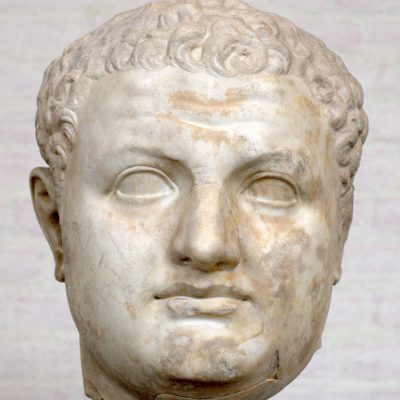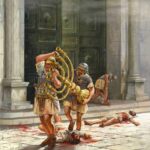Chapters
| Name |
Titus Flavius Sabinus Vespasianus |
|---|---|
| Ruled as |
Imperator Titus Caesar Vespasianus Augustus |
| Reign |
24 June 79 – 13 September 81 CE |
| Born |
30 December 39 CE |
| Died |
13 September 81 CE |
Titus Flavius was born on December 30th, 39 CE in Rome as Titus Flavius Sabinus Vespasianus. He was the son of the emperor Vespasian and Domitilla the Elder. Older brother of Domitian and Domitilla the Younger.
Titus Flavius was a Roman emperor in 79-81 CE. He ended the Jewish war. During his reign, there was also the eruption of Vesuvius.
In childhood, he grew up with the son of emperor Claudius and Messalina – Britannicus and miraculously escaped death when Britannicus was poisoned by Nero. Titus drank only a small sip of the dish given to them and he suffered for a long time. Vespasian from the beginning prepared his son to rule, entrusting him with numerous military and administrative duties. In 57 CE he was enlisted in one of the Rhine legions, where he served as a tribune. In the year 59 CE, he returned to Rome, where he began studying law. In the East, he stayed from June 66 to June 71 CE. From 67 CE together with Vespasian he suppressed the Jewish uprising in Palestine.
From 69 CE he carried out his own actions, once Vespasian was declared the emperor in Alexandria. Titus ended the Jewish war (66-70 CE) by taking and destroying Jerusalem. In the initial stage of the siege operations, he was cut off from the escort and was almost taken prisoner. Neither Titus nor his father, Vespasian, took the title of Iudaicus (“Jewish”) probably in order not to annoy the Jewish Diaspora. During the reign of his father, he was the prefect of the pretorians and, as Suetonius writes, he became famous for his ruthlessness. He ordered the murder of the former commander of Vitellius – Aulus Cecina, who was an opponent of his father.
Emperor
When his father died, it became clear that he would become the new emperor. There was a fear that he would be the second Nero. However, this conviction was brief. After taking the throne, he proved to be a gentle and forgiving ruler. Suetonius calls him “love and delight of the human race” (amor et deliciae generis humani). Once the emperor realized that he had done nothing good for the subjects on one day, he would call “Friends, I have lost a day” (Amici, diem perdidi!).
The attitude of people to Titus changed because of two accidents. During his reign, there was a Vesuvius eruption in 79 CE. Once in 80 CE in Rome, there was a dangerous fire and plague, which caused rumours that Titus was not favoured by the gods. Titus helped people who were in need very energetically. He eagerly listened to people’s requests and although many of them were impossible to fulfil, he was always eager to promise help. He said that no one should leave the emperor in bad mood.
During his reign, the construction of the Colosseum was completed, after 10 years of work.
The painting depicts the Flavian family in a triumphant parade in 71 CE. Vespasian is at the front of the family, dressed as pontifex maximus. Behind him is Domitian with Domitia Longina and Titus in religious dress.
Death
He died on September 13, 81 CE. at the family estate in Raete after a short illness, most likely was fever. Suetonius states that Domitian deliberately did not help him (Cassius Dio, who mentions Domitian’s plots against Titus, claimed similarly). According to Flavius Philostratus, Titus was poisoned by Domitian.
Suetonius states that Titus died without finishing the sentence: “I have made but one mistake…”. He did not reveal what it was. Titus co-ruled with the Senate in a very cohesive manner; that is why he received favourable opinions from Roman historians. He also hated blood in the arena and never let injured gladiators be killed in his face. He could sing and play the lyre, put together good poems, and he was an amazingly capable stenographer.
He was recognized as divus.
|
Marriage and offspring |
|









